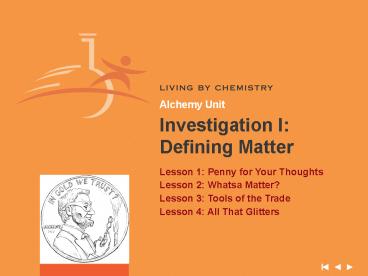Alchemy Unit PowerPoint PPT Presentation
1 / 22
Title: Alchemy Unit
1
Alchemy Unit
- Investigation I Defining Matter
Lesson 1 Penny for Your Thoughts
Lesson 2 Whatsa Matter?
Lesson 3 Tools of the Trade
Lesson 4 All That Glitters
2
Alchemy Unit Investigation I
- Lesson 1
- Penny for Your Thoughts
3
ChemCatalyst
- Long ago, early scientists tried to turn ordinary
things into gold. This pursuit was called alchemy
and the people who engaged in alchemy were called
alchemists. - Do you think the alchemists were successful in
turning things to gold? Explain your thinking.
4
Discussion Questions
- Why do you think alchemists wanted to turn
ordinary things into gold? - Do you think the alchemists were successful?
Explain why or why not. - Do you think it is possible now to turn other
metals into gold.
5
You will be able to
- Watch a Demonstration and describe your
observations. - I will be demonstrating an experiment that is
similar to one done by alchemists hundreds of
years ago in their search for the key to making
gold. While, doing the demonstration you should
gather evidence to address the question
6
The Big Question
- Can we turn a penny into gold?
7
Activity
- Purpose In this activity you will be
transforming a copper penny and discussing what
happens. - Safety Note You must wear safety goggles at all
times. DANGER! Sodium hydroxide will burn skin,
eyes, and clothing.
(cont.)
8
Making Sense
- Do you think you made real gold?
- How could you find out?
9
The Alchemists Dream
COPPER SILVER GOLD
Zinc coated Brass Copper Zinc
10
Zinc Pennies
Before 1982, all pennies were solid copper
(except 1943).
Copper was used to make bullet shells in WW
II. By 1943, the supply of copper metal was in
short supply. The US government did not want
to waste copper on making pennies.
Pennies were made with steel metal.
They looked silver.
A shortage of copper drove the price of copper
up in the early 1980s. If melted down, the
copper could be sold for more than one cent.
After 1982, pennies were made from zinc. A
thin coating of copper was pressed on the zinc.
11
Alchemy vs. Chemistry
Alike
Different
Different
Topic
Topic
Chemistry
Alchemy
12
I think youve crossed that thin line between
transmuting and cooking.
13
Paracelsus
Man consisted of three elements SALT represented
the body SULFUR the soul MERCURY the spirit
He thought he could rearrange the amounts of the
elements to change man.
He desired immortality and searched for a
mystical elixir of life.
14
The Beginnings
early practical chemistry household goods,
weapons, soap, wine, basic medicine
The Greeks believed there were four elements.
D
earth air fire water
15
Four Element Theory
- Plato was an atomist
- Thought all matter was composed of 4 elements
- Earth (cool, heavy)
- Water (wet)
- Fire (hot)
- Air (light)
- Ether (close to heaven)
Relation of the four elements and the four
qualities
Blend these elements in different proportions
to get all substances
16
Timeline
Greeks (Democratus 450 BC) Discontinuous
theory of matter
Issac Newton (1642 - 1727)
ALCHEMY
2000
1000
300 AD
400 BC
Greeks (Aristotle 350 BC)) Continuous theory
of matter
American Independence (1776)
17
Alchemy
In Europe, alchemy was
the quest for the Philosophers Stone (the
elixir, the Sorcerers Stone).
Allegedly, this substance would turn cheap metals
into gold.
18
transmutation
changing one substance into another
In ordinary chemical reactions, we
cannot transmute elements into different elements.
19
Alchemy
- After that chemistry was ruled by alchemy.
- They believed that that could take any cheap
metals and turn them into gold. - Alchemists were almost like magicians.
- Elixirs, physical immortality
20
Alchemy
Alchemical symbols for substances
transmutation changing one substance into
another
D
In ordinary chemistry, we cannot transmute
elements.
21
Alchemy was practiced in many regions of
the world, including China and the Middle East.
Alchemy arrived in western Europe around the
year 500 C.E.
Modern chemistry evolved from alchemy.
22
Contributions of alchemists
Information about elements - the elements
mercury, sulfur, and antimony were discovered -
properties of some elements
Develop lab apparatus / procedures / experimental
techniques - alchemists learned how to
prepare acids. - developed several alloys
- new glassware

